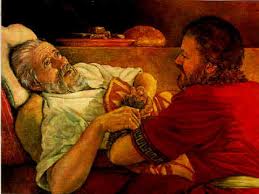Recessive Sins – and What to Do
 What is a Recessive trait?
What is a Recessive trait?
A person with a recessive trait inherits it from both of his parents. For example, blue eyes are a recessive trait. For my kids to have blue eyes, both their father and mother must carry the blue-eyed recessive trait. My father had blue eyes, but my mother was brown-eyed, yet she carried the blue-eye trait, as evidenced by my blue-eyed sister and by the fact that I have blue-eyed children even though both their parents have brown eyes. My husband has brown eyes, but he carries the blue-eyed trait from his father.
Recessive traits are often hidden, and don’t show up for generations down the road. Dave’s parents had no children with blue eyes, but they have grandchildren with blue eyes.
There are health issues, diseases, and characteristics (such as blue eyes) that are sometimes seemingly absent for generations. Then they show up, and the only way we know they are there is because they show up.
How Sins can be Recessive
That’s how it is with our sins. Sometimes there are sins or attitudes lurking down underneath the surface. We don’t even realize they are there until they shoot up and out. Sometimes we wonder. “Now where did that come from?!”
It’s a subtle thing – and so like our Enemy. We hear ourselves or watch others (sometimes) and think, “Who would have thought?!”
I think of recessive sins as those who are held onto and rooted deep down in us. These are habits or strongholds that we continue to use and be a part of rather than asking God to give us victory over them. When we confess our sins, make restitution, and forgive others, we’re not bound by nor struggle with those hidden sins. Recessive sins are sins that are (sometimes) passed down to us through the stronghold of others in our lives.
Abraham and Sarah passed on the recessive sins of deceit and lying to their son Isaac, who passed them down to his son Jacob, whose sons inherited the same traits. We can follow the trail right down through each generation. When children experience something modeled in the daily of life, they tend to think it’s okay and normal. They copy that model, be it good, bad, or indifferent.
Abraham
Abraham and Sarah went to Gerar. To hide the fact that Sarah was his wife, Abraham told the king that she was his sister. That was true, for they were half-siblings. The problem is that wasn’t the whole truth. Abraham’s intent was to give the impression they were not married (to protect himself – see Genesis 20:11). By hiding information that would normally have been given, Abraham implied he wasn’t married. Abraham used the literal truth to imply an untruth.
You can read the story as it is found in Genesis here.
Isaac
Some years later, Isaac repeated the lie of his father. He was also living in Gerar, and he told King Abimelech that Rebekah was his sister. The king observed Isaac and Rebekah from his window one day and realized they were more than brother and sister! Isaac’s reason for the lie was the same as his father’s: he was afraid for his life. You can read the story here. I suppose King Abimelech was thinking to himself, “Like father, like son.”
 Jacob
Jacob
Years later, Jacob – Abraham’s grandson and Isaac’s son – exhibited the same behavior. Jacob was a conniver. He cheated his twin brother out of his birthright by lying to his father about who he was. I wonder where he learned that?! Later still, the lying gene showed up again when he deceived his father-in-law. Jacob had many encounters with God. There were times he recommitted himself to Jehovah. God promised to make a great nation of Jacob’s descendants – and He did. God met Jacob in mighty and powerful ways. They had a relationship – but that deceitful trait remained dormant and resurfaced time and time again.
Jacob’s sons
The recessive sin of lying continued to weasel its way through his descendants. His own sons intentionally deceived their father when they brought him Joseph’s coat of many colors and said,
“We found this. Examine it to see whether it is your son’s robe.”
The sons did not tell an outright lie.They deliberately spoke truth to imply a lie. The coat did belong to their brother, and it did have blood on it. Yet, that was not the whole story! That recessive trait of deceit and protecting one’s own interest was passed on from generation to generation.
The How and Why of Recessive Traits
Our sin nature is pervasive. While every sin we commit cannot necessarily be traced to a previous generation’s error, it is abundantly clear that when a sin is not conquered in our life and instead becomes a way of life, there is great potential for it to be passed on as a pattern in future generations. One family’s struggle might not be deceit. It could be pride, greed, jealousy, bitterness, rivalry, or anger. When we are not careful to uproot a sin in our lives, it will bear fruit in future generations, thus becoming recessive sin. If we harbor anger or bitterness toward a parent or grandparent, you can be sure our kids will carry the grudge down the years, even if they don’t know what the grudge was about when it began.
Recessive sins are those traits, character flaws, and sins that become a part of us because of what has been modeled. If a father is obsessed with wealth or prestige, guess what often becomes most important to his children?! If a father spends his time serving others, helping lonely folk, and donating for causes, his children will more likely want to spend time helping others. When a mother’s career is more important to her than being a mother, her children will likely develop the same attitude. When a guest is more important than decor, our kids learn about hospitality.
Why the Apple doesn’t fall far from the tree
We don’t have to teach our kids; they learn it by observing (or osmosis!). We don’t have to tell them how to think; they will catch our attitudes by absorption. Values are caught more than they are taught.
 Those things important to parents will often be picked up by their children. Our focus becomes their focus – and soon people are saying of our kids, “The apple doesn’t fall far from the tree.” That can be a good thing; and again, sometimes a very bad thing.
Those things important to parents will often be picked up by their children. Our focus becomes their focus – and soon people are saying of our kids, “The apple doesn’t fall far from the tree.” That can be a good thing; and again, sometimes a very bad thing.
What to do about recessive sins
- First, we need to recognize the sin and call it what it is-SIN. When we are not willing to admit sin, it’s hard to name it.
- Name it. Give it a face and a name – it will help you recognize its shame.
- Confess the sin. Bring it out of the closet instead of denying its existence.
- Make yourself accountable to someone who knows you well and can encourage you to keep pulling those roots before they become imbedded and continue to bear fruit.
- Ask God for wisdom – and for conviction – when that recessive sin rears its ugly head.
- When you fail, make things right – if you are sincere, you’ll know what to do.
The stories of Abraham, Isaac, and Jacob give me courage. It’s true they failed in many ways, and their failures affected future generations. Their families – and others – suffered because of the failures of these men. Yet our God is a God of grace. He pardons and He cleanses. Our God heals, and He restores. He did this for Abraham, for Isaac, and for Jacob. Jehovah God does the same for us, today!

This is a repost from five years ago.





